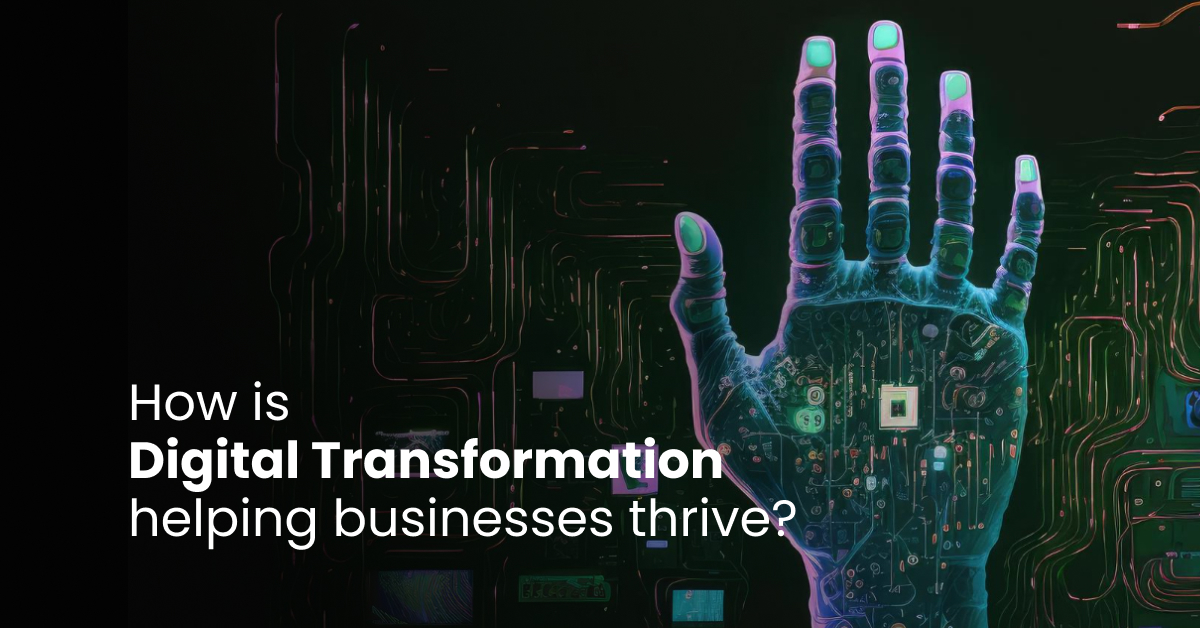Digital transformation (DT) has become more than just a trendy catchphrase; it is now an indispensable tool for achieving business objectives. Picture your business as a ship cruising through the vast sea of technology where, adaptation and transformation are not merely options; they are prerequisites for survival and success.
So, what exactly is digital transformation, and why is it so critical for your business? Why are companies worldwide diving headfirst into this concept? Do not fret; this blog covers all the essentials of digital transformation, much like the components of a well-tuned machine. From crafting a robust digital transformation strategy to harnessing the power of innovative technology, we will explore it all. And that is not all; we will also delve into the future, shedding light on emerging trends shaping the digital transformation landscape in the coming year.
In the business world, every investment must yield measurable returns. This is why we will conclude our journey by exploring how you can assess the impact of your digital transformation initiatives. Whether you are a business leader looking to grasp the fundamentals of digital transformation or a professional eager to stay ahead of the curve, this blog post serves as your compass for navigating the digital seas.
Understanding Digital Transformation
Digital transformation is the pivotal shift where digital technology becomes the backbone of your business operations, delivering value to your customers. It is akin to giving your business a tech-savvy makeover. However, digital transformation is not a one-size-fits-all concept; it can take various forms. It might involve automating manual processes that once consumed your valuable time or venturing into the creation of groundbreaking digital products and services that can revolutionize your industry.
Why do businesses, like yours, embark on the journey of digital transformation? It is quite simple: it is the path to staying competitive and relevant in a rapidly evolving business landscape. But here is the catch: the term “Digital Transformation” can mean different things to different organizations. We have gathered several definitions to help you choose the one that best suits your needs.
For instance, Brian Solis provides a comprehensive definition, stating, “Digital Transformation is the realignment of, or new investment in, technology, business models, and processes to drive new value for customers and employees.” This realignment is crucial for businesses to thrive in the dynamic digital economy, with the primary focus on delivering value to customers and employees.
Paige O’Neill, CMO of Sitecore, emphasizes that digital transformation is not a single project or change but an organization-wide restructure that extends to people, operations, and technology. Numerous experts highlight digital transformation as the process of enhancing customer and employee experiences through innovative technology solutions.
Key Components of Digital Transformation
Digital Transformation (DT) is akin to a modern business makeover, focusing on shedding outdated processes and embracing modern technology. As per Forrester’s research, Chief Information Officers (CIOs) allocate a significant 72% of their budgets to maintaining existing IT systems, leaving only 28% for new projects and innovation. This balance between keeping old systems running and investing in new tech is essential, especially with startups causing disruptions, much like Uber’s impact on the transportation sector.
Business executives are constantly under pressure to adapt and deliver results. Yet, digital transformation goes beyond gadgets; it is a holistic change that affects every aspect of a business, from processes to culture and customer experiences. To understand it, we need to explore the key components that drive a successful digital transformation journey.
Components of Digital Transformation
Digital Strategy: Think of digital transformation as a grand voyage. You need a roadmap, right? Well, that is your digital strategy. It is akin to plotting your course before setting sail. Without it, you might wander aimlessly. Your strategy should be detailed, focusing on why you are changing and where you want to reach.
Data Analytics: Imagine having a treasure map, and that’s your data. Digital transformation is all about using innovative tech to make sense of this data. You collect information from various sources, analyze it with fancy tools, and voilà, you have insights that can boost your business.
Customer-centricity: Picture this: Your success depends on your customers. It is like aiming to please your audience, much like a performer on stage. You have to be customer-centric, which means everything you do revolves around making your customers happy. You design products and services that cater to their needs, and you offer top-notch customer service.
Processes: Think of your business processes as gears in a well-oiled machine. To go full steam ahead in digital transformation, you need to fine-tune those gears. Optimizing processes makes your business lean, mean, and agile. It saves costs and improves quality.
Technology: Ah, technology, the wind in your digital transformation sails! You need the right tools for the job. Cloud computing, big data analytics, artificial intelligence, the Internet of Things (IoT), and other tech wonders are your crew members. They help you navigate these uncharted waters.
Culture: Now, imagine your organization as a lively crew on your ship. Digital transformation requires a culture of innovation and agility. You want your crew to embrace change, be open to experiments, and learn from every wave. It is all about staying ahead of the curve.
People: Lastly, let us talk about your people’s skills. Digital transformation demands capable people. You need individuals who can steer the ship through digital storms. So, invest in training and developing your crew. Equip them with the skills needed to brave these new waters.
Importance of Digital Transformation
As an entrepreneur, you understand the need to adapt to the ever-evolving business landscape. One of the primary reasons for diving into the realm of digital transformation is survival. It is the business world’s way of saying, “Adapt or get left behind.” But why is this whole digital transformation crucial? Let us delve into some fascinating statistics:
- The IDC (International Data Corporation) Worldwide Semiannual Digital Transformation Guide predicts that global spending on digital transformation-enabling tech and services will skyrocket to a staggering $2.3 trillion in 2023.
- According to Markets and Markets, the digital transformation market is on a growth spree, with an expected annual increase of 19.1%. We are talking about soaring from $695.5 billion in 2021 to a jaw-dropping $3144.9 billion in 2030.
- The World Economic Forum states that digital transformation is worth an overwhelming $100 trillion for society and industry combined by 2025.
- The COVID-19 pandemic accelerated digital transformation. A survey by Deloitte disclosed that 60% of executives believe the pandemic fast-tracked digital transformation, and 62% think it will remain a top priority for the next couple of years.
Now, if you are still wondering why there is a buzz around digital transformation and what it means for businesses, stick around. We are about to uncover some game-changing benefits that might just make you want to join the digital transformation party.
Digital Transformation Benefits
In the digital realm, customer experience reigns supreme. 92% of leaders are investing in digital transformation to level up customer satisfaction. Digital transformation means tracking metrics for smart decision-making. Insights help understand customers and revamp strategies, boosting ROI (return on investment). Digital transformation unites departments for a seamless transition toward common goals.

Being agile and innovative is a top priority in digital transformation, keeping businesses ahead of the curve. It opens doors to new products, markets, and deep customer understanding, creating a competitive advantage. It automates processes, cuts waste, and optimizes supply chains, resulting in significant cost reductions of up to 50%, according to McKinsey.
Digital Transformation Strategy
As you revamp your business model, reimagine your products and services, and even forge new value chains to meet the ever-evolving demands of your customers, a well-crafted digital transformation strategy is your North Star. It guides you, keeps you on track, and leads you to success in the digital age.
Now, let us delve into how to kickstart your digital transformation journey:
- Defining Digital Transformation: What does digital transformation mean to your organization? This is your roadmap for the future. By defining what it means for you, you will pinpoint the areas that need your attention the most.
- Know Where You Stand: Take a good look at your current setup. Check out your website, social media presence, and customer management system. Understanding where you are now is crucial for planning the journey ahead.
- Getting Everyone on Board: Secure executive buy-in, share your findings, hold meetings, and ensure everyone is on the same page. This early agreement sets the stage for success.
- Craft a Smart Strategy: Draw up your battle plan, but keep it manageable. Break your transformation into phases, get stakeholders involved, and be ready to adapt. Flexibility is your secret weapon.
- Skills Matter: Evaluate your team to spot any gaps. It is time for some training or fresh talent. The right skills make all the difference.
- Keep an Eye on Risks: Identify and document potential risks, like putting insurance on your project. By keeping an eye on them, you will stay prepared for whatever may come.
- Test the waters: Run pilot tests to see how digital transformation fits your business and culture. It is like a trial run before the big show.
- Prepare for a Culture Shift: Changing the way things work can be challenging. Be ready for it and embrace the change as part of the journey.
Digital Transformation Trends
As we approach the end of 2023, let us address the trends that have been shaping the world of digital transformation. In this section, we will examine key developments that have impacted the year and help you prepare for the changing digital landscape.
Adoption of AI (Artificial Intelligence) and ML (Machine Learning): AI is no longer just a buzzword; it is a driving force behind smarter decisions. Businesses are using AI to gain insights into customer behavior and preferences, while machine learning tailors experiences for customers, giving your business a competitive edge.
The Surge in Cloud Migration: Cloud technology is at the heart of digital transformation. It makes scaling up, adapting to change, and achieving flexibility seamless while cutting costs and improving accessibility.
Cybersecurity Takes the Center Stage: Securing your digital assets, intellectual property, and sensitive customer information is paramount. In 2023, cybersecurity will be a rock-solid shield that companies continue to fortify.
Investing in Employee Upskilling: Your team needs to stay in the loop, as technology evolves at lightning speed. Upskilling ensures your employees have the knowledge and skills to thrive in the digital age, propelling your business forward.
The 5G Revolution: 5G, with its lightning speed, is a momentous change, opening the door to various technologies like IoT and AI, making business operations more efficient and elevating customer interactions.
The IoT Integration: IoT connects everything and collects invaluable data from various devices, providing insights into operations, enhancing decision-making, and streamlining processes.
Data Privacy and Compliance: In the digital age, it is essential to have robust data privacy and compliance measures in place to protect your data from cyber threats and adhere to regulations like GDPR, CCPA, and HIPAA.
No-Touch Solutions and Digital Payments: Businesses are embracing contactless technologies, enhancing efficiency, and elevating customer experiences.
As senior managers and entrepreneurs, here is your roadmap:
- Research DT examples and key trends.
- Reimagine your business model.
- Craft a distinct DT strategy.
- Apply trending tech to optimize your business.
- Create a competitive advantage with DT.
It is time to embark on a journey to create engaging and meaningful customer experiences through digital transition and innovation. This movement is global, and staying ahead of the curve is key to thriving in the digital economy.
Measuring ROI in Digital Transformation
Measuring ROI in digital transformation is not a one-size-fits-all endeavor. It is a dynamic field, and traditional ROI calculations often do not fit. Every industry is unique, but the goal is the same: business success through technology. Here is the game plan:

- Define Your Business Objectives: Start with a clear focus. Do you want more revenue, enhanced productivity, or happier customers? Identifying your primary goal sets the direction.
- Set Investment Goals: Get specific about your investments – whether it is people, infrastructure, or technology. And do not forget the magic number: how much you need to invest.
- Choose Value Metrics: Metrics are your guiding stars, revealing if you are on the right path. It could be metrics like revenue growth, employee productivity, or others that reflect value.
- Time It Right: Knowing when you will see results is essential. Set a specific time limit and check your baseline metrics to understand where you are starting.
Bonus Tips:
- Have some preliminary metrics from the start, even if they are hypothetical.
- Love micro-metrics for agile testing.
- Think beyond cost savings; ROI is about value, not just pennies saved.
- Stay flexible; review and adjust regularly based on your metrics.
That is your guide to measuring ROI in the world of digital transition. It is a mix of art and science, but when done right, it is the key to your digital success.
Success Stories in Digital Transformation
Several companies have pivoted toward success by successfully implementing digital transformation:
- TGI Fridays and IHOP – Virtual Assistants for Ordering: These restaurant giants have embraced digital transformation by introducing virtual assistants for mobile ordering to stay competitive with tech-savvy boutique brands.
- Porsche – Prioritizing Customer Experience: Porsche has heavily invested in understanding and documenting every customer interaction, centralizing the data for a seamless customer experience.
- Deloitte – The Competency Hub: Deloitte’s creation of Deloitte Digital Today, a hub that brings technical, creative, and digital expertise together, supports their clients on their digital transformation journey.
- Rockwell Automation – Journey to a Connected Enterprise: Rockwell Automation envisions becoming a fully connected enterprise and is focusing on improving the customer experience as a step toward achieving this goal.
- Disney – Strategic Acquisitions: Disney’s strategy involves smart acquisitions, such as purchasing BAMTech for streaming technology and investing in acquiring 21st Century Fox’s assets to establish a direct consumer connection.
Partnering in Digital Transformation Success
If you are wondering how to kickstart your transformation journey, you have come to the right place. At FutureX, we are not just your typical service provider; we are your trusted partner in this transformative journey. This transformation is not a one-size-fits-all endeavor; it is about crafting a tailored strategy that perfectly aligns with your unique goals and objectives.
We specialize in digital transformation consulting and strategies that work, whether you are a dynamic startup or a Fortune 500 giant. Our journey lies in creating meaningful success stories. We have been the architects behind numerous transformations, turning business dreams into digital realities. We are not here to dictate but to collaborate. Let us team up to mold a digital transformation strategy that is bound to make your business shine. When you are ready, reach out, and we will be by your side, ensuring your digital transformation journey is nothing short of spectacular.
























